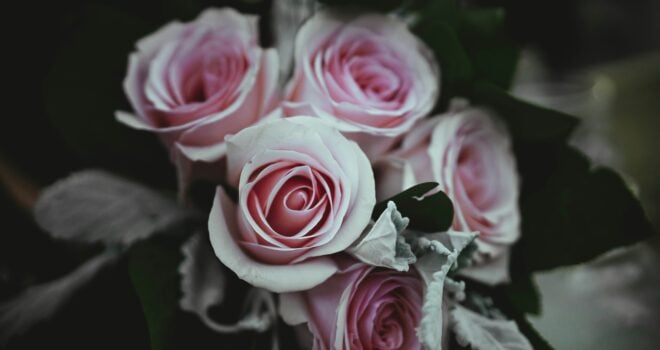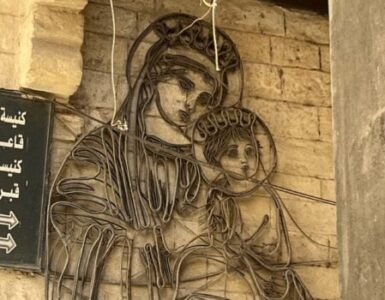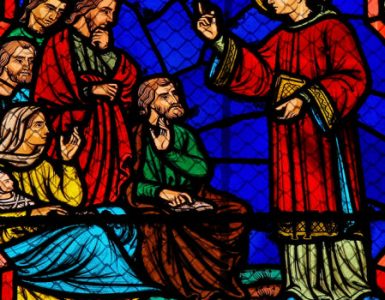Shout for joy, O daughter Zion!
Sing joyfully, O Israel!
Be glad and exult with all your heart,
O daughter Jerusalem!
The 3rd Sunday of Advent has been known for centuries as Gaudete Sunday, from the first word of the Entrance Antiphon for Mass. Gaudete means “rejoice” in Latin. The psalm last Sunday stated: “I rejoice heartily in the Lord … for he has clothed me in a robe of salvation.” And the Virgin with child states: “My spirit rejoices in God my Savior, for he has looked upon his lowly servant … and he has mercy on those who fear him.” And so, we sing with St. Paul: “Rejoice in the Lord always … for the Lord is near at hand.”
But why do we rejoice on this particular day?
Well, historically Advent in northern European countries was quite penitential and longer than four weeks. Our forefathers there did not eat eggs, meat, or dairy during the run up to Christmas. To the south, in Rome, however, Advent was more a time for feasting and revelry. Somewhere along the line these two customs melded into the four weeks of Advent which became known as “Little Lent.” There was fasting, but it was not as severe as in Lent, as the Church was not preparing for Christ’s death, but the more joyful occasion of His birth.
Going back about 1200 years or so, the custom started on the 3rd Sunday of Advent for popes to bless special roses made of gold that were then sent to the Catholic kings and queens throughout Christendom. Thus, this Sunday became known as Dominica de rosa: Sunday of the Rose.
Gaudete Sunday then, the “Sunday of the Rose,” became a breather amid a penitential season; a little rejoicing amidst the penance and fasting. Rose-colored vestments, when available, were utilized, and rose-colored candles as well. So, pink is not actually the liturgical color. The color is rosacea, from the Latin “made of roses.”
Now, many of you might be thinking: “A breather from fasting and penance? I’m not fasting and doing penance. I need a breather from shopping, parties, and Christmas candy.” Most of the world, you see, is on the secular (the non-Christian) Christmas schedule; the one that begins on Black Friday, and ends after the last present is opened on December 25th.
And so, what is the point of Gaudete Sunday if we are not fasting, doing penance, and giving alms the rest of Advent? Well, there is no point at all. A priest-scholar wrote that Gaudete Sunday “is just awkward vaudeville rather than true drama if there is no penance to lighten or discipline to lesson.”
Advent, then, when celebrated correctly, is the guide to true joy. Unfortunately, the priest wrote that Advent “has become a Lost Season, just as Confession has become a Lost Sacrament—because our culture is impatient for joy and tries to be satisfied with tinsel happiness” (George Rutler). Another scholar illustrated the tragedy of the lost season of Advent, but he did so in a more humorous fashion. He wrote:
At the risk of sounding like Scrooge, I fully intend to shoot Rudolph and mount his head, red nose and all, over my mantelpiece this holiday season. And I really don’t mind sounding like Scrooge, the immortal Dickens character from “A Christmas Carol.” His complaints are compelling, and we can laugh at them in a detached way. But the reason we really like [Scrooge] is that he is a convert. When he falls to his knees, he brings us to our knees along with him. We always rejoice at the end of that story in its countless retellings because a soul has been rescued from hell.
In the meantime, we live through a form of hell that ironically begins the day after Thanksgiving. The secular world calls it the Holiday Season. The Catholic Church calls it Advent. The two are starkly different, but the one thing they have in common is suffering. One group has started early with the Christmas cheer, and they wonder why they are so miserable. The other group is waiting, waiting, anticipating the great day, and the wait is hard.
For me, the chief form of penance during Advent is shopping. I’m not talking about Christmas shopping. I’m talking about any shopping: grocery shopping or hardware shopping or buying gas at the station. Why? Because every retail establishment feels obligated to inflict on us that grindingly obnoxious “holiday” music. It starts blaring right on cue the day after Thanksgiving, as if to say, “Stop being thankful, and start feeling the pain.” They won’t play the beautiful carols because those tend to mention shepherds and angels and heavenly hosts and virgins, and, when it comes right down to it, that specific baby who apparently never fussed and yet caused all the fuss.
The scholar ends his observations thusly:
The world is out of whack about most things, as epitomized by it getting Christmas totally wrong. It attempts to celebrate it before it happens and without the actual reason for celebrating it. It partakes of Christmas pleasures throughout Advent, and then walks away just as the real event gets underway. The result is a pleasure that is unsatisfying. Abstinence is not a concept the world takes a liking to. It has the same problem with Advent that it has with sex and marriage: Celebrating too soon, and then not properly celebrating at the right time. Not feasting at the right time and then fasting at the wrong time. (Dale Alquist)
The Jews in the prophet Zephaniah’s time had the feasting and the fasting all wrong. They sacrificed their children by burning them on altars in a south Jerusalem neighborhood called Gehenna. Then apparently they went to the temple and gave money to the priests to burn lambs and what not, thinking that somehow made everything okay with God. And instead of those priests giving the people the truth, they took their money and just played along with the charade. And so, Zephaniah called those priests faithless men who “profaned what is sacred, while doing violence to the law” (Zephaniah 3:3-8). Does any of that sound familiar?
My friends, start praying harder in this run up to Christmas. Do acts of penance, fast and give alms. Go to confession. Why, you might ask? What is the point? Listen to John the Baptist. He’ll tell you why:
His winnowing fan is in his hand to clear his threshing floor and to gather the wheat into his barn, but the chaff he will burn with unquenchable fire.
If our salvation is a foregone conclusion, if we are already saved by faith alone, then Holy Mass becomes nothing more than awkward vaudeville. The sacred gets profaned, and it’s just for show.
But know this: the baby who caused all the fuss was born to die. Holy Mass is the sacred mystery that re-presents that death, the supreme sacrifice that saves anyone willing to carry his own cross and persevere during this time of exile. That means the unquenchable fire is still in play for all of us. And that is what makes our lives on earth true drama—for in this life souls can be rescued from hell.
Rejoice, then, for the Lord is near. He is more than near; He is in our midst. He is hanging in His Mystical Body for you at Mass. In the silence look up and understand: He is looking at you. Listen to Him say: It’s not a show. It’s true drama. So, rejoice, for this is what I do to save you. Cooperate in the process. Then afterwards I’ll clothe you in a robe of salvation, and you can rejoice with me forever—in heaven.
Photo by OC Gonzalez on Unsplash












